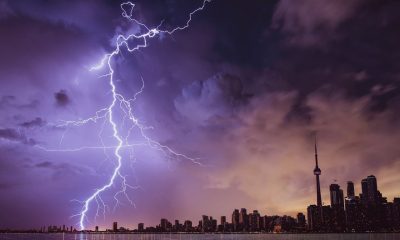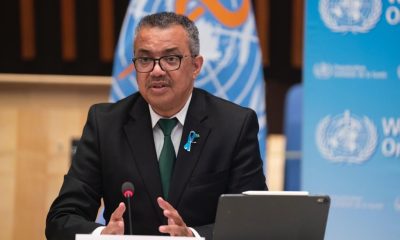News
Russia’s rigged elections look nothing like the US election – they have immediate, unquestioned results there

If you want to know what stolen elections look like, look at Russia, where we have studied elections and the media for decades. (File photo: Arnaud Jaegers/Unsplash)
The 2020 election, in which Joe Biden is the projected winner, is not what a rigged election looks like.
Rigged elections are organized. Vote counts certainly don’t play out in front of the country on television screens. When it’s a decentralized, sprawling affair that is broadcast for many days and nights, you can be pretty sure it’s democracy.
If you want to know what stolen elections look like, look at Russia, where we have studied elections and the media for decades.
The early heyday of Russian democracy was very messy. Just after the Soviet Union collapsed in 1991, the Kremlin poured money and resources into a Western-looking pro-market party called Russia’s Choice. Despite the money and help it got, the party failed spectacularly in the 1993 election. Meanwhile, nationalists and Communists, parties with strong connections to voters and their beliefs, won their way into power through the elections. But outcomes were unpredictable and the campaigns were chaotic.
How to steal an election, Russian-style
Over time, the Putin regime systematically consolidated its domination over politics, turning elections from a democratic contest into a controlled system that delivered regime victories.
Russian elections are now state-directed performances that eliminate opposition. Random targeted arrests and violence – especially against those who try to lead alternative political movements – are common. Alexei Navalny, leader of a reform movement and now recovering from a poisoning, could tell us a lot about that. So could Yegor Zhukov, a student blogger who was arrested and convicted of extremism and then beaten outside of his home for his political actions.
Even eliminating viable opposition can’t ensure certain victories at the polls. To eliminate all risk, as Russia demonstrates, autocrats must take four additional steps:
- Dominate the media message by controlling major news outlets through ownership, creating laws that stifle press freedom and repressing outspoken journalists.
- Assert control over local government officials who then ensure that voters turn out to support the regime.
- Build a vote tabulation process that allows ballot stuffing and falsified vote counts.
- Declare victory immediately and allow no questioning of the results.
Emerging from a decade of economic and political chaos in 2000, President Vladimir Putin honed his electoral machine to do just that. The Kremlin used its media control to project a dominant narrative in support of Putin. He never campaigned for votes. He appeared nightly on state television delivering new technology to hospitals or dedicating new monuments to Russia’s World War II victory. All this creates the image of an unassailable leader and inevitable winner.
Together with legislative allies, the Kremlin changed electoral laws at every election to maintain the dominance of the pro-Kremlin party.
Government officials, including governors and mayors who rely on the Kremlin to keep their jobs, also have developed informal practices to deliver victories. For example, local officials demand that state workers in factories, hospitals and schools turn out to vote. It’s common to insist that employees bring other voters with them or face losing their jobs. These officials also put paid loyalists on buses to vote at several polling stations in a single day.
There is an unwritten regulation that poll workers must be members of the pro-Kremlin party, United Russia. And they count behind closed doors, padding the vote as they go.
Kremlin tactics not possible in US
How Russia’s leaders have rigged their elections is the opposite of the transparent and accountable vote tabulation that played out online and on television across the U.S. That open and deliberate process, both of counting and reporting the results, underscored that widespread electoral fraud is not feasible in the U.S.
In the United States, the opposition is protected by constitutional rights and strong democratic norms. President Donald Trump is mostly limited to name-calling and slurs – inelegant, but not illegal. Trump also must work within the legal system, filing lawsuits that have been largely unsuccessful so far.
The country’s democratic institutions held, regardless of the partisan tenor of the states or localities in which votes were being counted. Despite pressure from the White House and the president’s vocal supporters, elected and appointed officials stood strong and played by the rules.
The failure of electoral disinformation
Even in the face of the COVID-19 pandemic, Republican-led legislatures in some swing states refused to allow early counting of an anticipated record number of mail-in ballots. The extended post-Election Day counting that turned the vote from Trump to Biden gave the president an opening to call the results into question.
THE OBSERVERS WERE NOT ALLOWED INTO THE COUNTING ROOMS. I WON THE ELECTION, GOT 71,000,000 LEGAL VOTES. BAD THINGS HAPPENED WHICH OUR OBSERVERS WERE NOT ALLOWED TO SEE. NEVER HAPPENED BEFORE. MILLIONS OF MAIL-IN BALLOTS WERE SENT TO PEOPLE WHO NEVER ASKED FOR THEM!
— Donald J. Trump (@realDonaldTrump) November 7, 2020
Yet, as numerous court cases have shown, the votes were carefully counted under the watch of observers from both parties and shown nationally on livestream feeds.
At the same time, media organizations made tough decisions to support electoral integrity, largely by not calling the election until the result was clear – despite growing pressure to do so.
Some networks switched off live coverage when a presidential press conference devolved into propaganda about fraud. That deprived the presidential narrative of air. Both steps are impossible in authoritarian states.
[Deep knowledge, daily. Sign up for The Conversation’s newsletter.]
So when President Trump makes claims about falsified ballots and a rigged election, we can imagine observers in the Kremlin shaking their heads and musing that Trump wouldn’t even know where to start with that.
The difference in the two systems is stark. Rigged elections in Russia rely on a system of management honed over years. In 2020, the decentralized, 50-state electoral process in the U.S. worked in the face of challenges to democracy.
This is what a democratic election looks like – big and fat and a bit of a mess.![]()
![]()
Regina Smyth, Professor of Political Science, Indiana University and Sarah Oates, Professor and Senior Scholar, Philip Merrill College of Journalism, University of Maryland
This article is republished from The Conversation under a Creative Commons license. Read the original article.





















